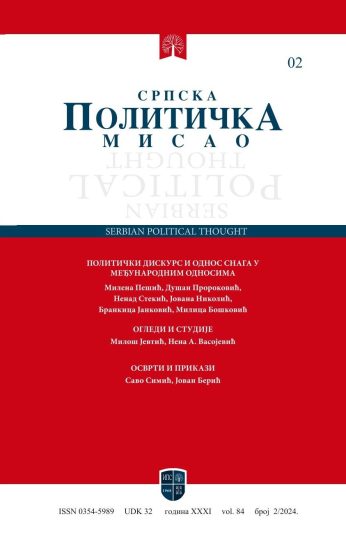Main topic
POLITICAL NEUTRALITY, STRATEGIC DETERRENCE AND TERRITORIAL INTEGRITY OF THE REPUBLIC OF SERBIA
GEOPOLITICAL POSITION OF SERBIA AFTER THE BEGINNING OF THE WAR IN UKRAINE: NEUTRALITY AND STRATEGIC DETERRENCE IN A CRISIS CONTEXT
Abstract
The Paper examines the contemporary geopolitical position of the Republic of Serbia after the beginning of the war in Ukraine, with the aim of confirming the hypothesis that even in the new, difficult geopolitical conditions, it is possible to maintain the current policy of military neutrality and increase its own capacities for strategic deterrence. Starting with the geopolitical position of Ukraine in the Eurasian space, the strategies and goals of “Great Powers” in this conflict and the importance that Russia’s current military confrontation with the “collective West” is taking in it, the first part of the Paper examines the influence of crisis in East Europe and on Serbia’s foreign policy strategy (which, before the beginning of conflict, was moving between neutrality and the “hedging strategy”). Therefore, first part of the Paper gives brief theoretical overlook on foreign policy strategies of small states and their conditioning by geopolitical factor, primarily geopolitical position. With all that taken into consideration, it is easier to have clear overview of Serbia`s current geopolitical position and dilemmas. The second part of the Paper is dedicated to the description of Serbia’s contemporary difficult position in the new geopolitical circumstances (“lonely and in the encirclement”), in order to better understand both the numerous challenges to which Serbia is exposed and its foreign policy moves aimed at preserving its military neutrality and the ability for strategic deterrence. On the one hand, Serbia wants to keep up its processes of accession to the EU and to continue to develop the best possible relations with the West and not to confront it and be isolated. On the other hand, Serbia wants to maintain existing relations with the Russian Federation which are of vital interest to Serbia because, as a permanent member of the UN Security Council, Russia is able to prevent the accession of Kosovo and Metohija, the breakaway southern Serbian province, to the United Nations as an independent state. Serbia also wants to preserve the current supply of cheap energy resources for its internal needs from the Russian Federation, because it has no real alternative for them. While remaining military neutral, Serbia also needs to increase its deterrence capabilites: the tightening of relations with certain neighbors increases not only the conflict potential, that is, the possible threat of the use of force, but also requires approaches of using “extended deterrence” with a necessary increase in independent forms of hard, military power, that is, additional investment in increasing one’s own combat capacities, which would achieve the maximum achievable deterrence effect. The final considerations in the Paper refer to the geopolitical perspectives of persistence in neutrality, that is, to the confirmation of the basic hypothesis of the Paper on the sustainability of this policy in difficult circumstances.
References
- Anastasakis, Othon. 2022. „The Russo-Ukrainian Crisis and the Western Balkans: Associations and knock-on effects.ˮ ACM Briefs. https://ascg.me/wp-content/ uploads/2022/02/ACM-Brief_January-2022-final.pdf.
- Benchev, Dmitar. 2019. Russia’s Strategic Interests and Tools of Influence in the Western Balkans. Riga: NATO StratCom Coe.
- Dugin, Aleksandar. 2004. Osnovi geopolitike, knjiga 1. Zrenjanin: Ekopres.
- Engdahl, William. 2010. „Ukraine and a Tectonic Shift in Heartland Power”, Global Research 22 March 2010, http://www.globalresearch.ca/ukraine-geopolitics-and-the-us-nato-military-agenda-tectonic-shift-in-heartland-power/18128.
- Friedman, George. 2013. “Ukraine: On the Edge of Empires.” Stratfor Weekly, December 17, 2013. https://www.stratfor.com/weekly/20101129_geopolitical_journey_part_6_ukraine.
- Gajić, Aleksandar i Nikola Rajić. 2022. „Geopolitički okvir ruske vojne intervencije u Ukrajini.” Politika nacionalne bezbednosti 22 (1): 127–146. doi.org/10.22182/pnb.2212022.6.
- Gajić, Aleksandar, i Slobodan Janković. 2012. „Četiri stuba srpske spoljne politike.” U Spoljna politika Srbije i zajednička spoljna i bezbednosna politika EU, 176–199. Beograd: Institut za međunarodnu politiku i privredu.
- Gajić, Aleksandar. 2022. „Geopolitički položaj i neutralnost malih zemalja: primer Srbije.” U Neutralnost i strateško odvraćanje, prir. Veljko Blagojević. Beograd: Medija Centar „Odbranaˮ.
- Igrutinović, Milan. 2022. „Strah i ambicija: Srbija, vojna neutralnost i strateško odvraćanje.” U Neutralnost i strateško odvraćanje, prir. Veljko Blagojević, 39–56. Beograd: Medija Centar „Odbranaˮ.
- Kolarski, Ljiljana. 2022. „The Impact of the War in Ukraine on Western Balkans.” The Policy of National Security 23 (2): 87–107. doi.org/10.22182/pnb.2322022.5.
- Konyvtar, Viktor. 2014. Ukraine in Europe (geographical location and geopolitical situation). http://www.mtafki.hu/konyvtar/Ukraine/Ukraine_in_Europe.pdf.
- Makinder, Halford. 2009. Demokratski ideali i stvarnost. Beograd: Metafizika.
- Morgan, Patrick. 1983. Deterrence: A Conceptual Analysis. London: Sage Publications.
- Novaković, Igor. 2019. „Stalna neutralnost u Evropi i strateška kultura.” Vojno delo (8): 242–255. doi: 10.5937/vojdelo1908242N.
- Politika. 2017. „Hoj Ti: Maligni uticaj Rusije na Balkanu.” Politika, 18.05.2017. Poslednji pristup 23. februar 2023. https://www.politika.rs/scc/clanak/380861/Hojt-Ji-Maligni-uticaj-Rusije-na-Balkanu.
- Ratković, Borislav (ur.). 1981. Vojni leksikon. Beograd: Vojnoizdavački zavod.
- Rutland, Peter. 2015. „Unnecessary War: The Geopolitical Roots of Ukraine Crisis” U Ukraine and Russia: People, Politics, Propaganda and Perspectives, ed. Agnieszka Pikulicka-Wilczewska and Richard Sakwa, 129–140. Bristol: E-International Relations.
- Spykman, Nicholas. 1942. America`s Strategy in World Politics: The US and the Balance of Power. New York: Harcourt, Brace&Co.
- Spykman, Nicholas. 1944. The Geography of Peace. New York: Harcourt, Brace&Co.
- Stepić, Milomir, 2004. „Promenjivost determinanti geopolitičkog položaja srpskih zemalja.” Srpsko pitanje – geopolitičko pitanje. Beograd: Jantar grupa.
- Stepić, Milomir. 2001. U vrtlogu balkanizacije. Beograd: Službeni list.
- Stepić, Milomir. 2012. „O srpskom geopolitičkom identitetu.” Srpska politička misao 36 (2): 11–40. doi.org/10.22182/spm.3622012.1.
- Vankovska, Biljana. 2020.“Geopolitics of the Prespa Agreement: Background and After-Effects”, Journal of Balkan and Near Eastern Studies 20 (3): 343–371. Oxfordshire: Taylor and Francis.
- Weber, Bodo, i Kurt Bassuener. 2014. Western Balkan and the Ukraine Crisis – a changed game for EU and US policies? DPC Policy Paper. Berlin – Sarajevo: Heinrich Boll Stiftung.
- Zarić, Ivan, i Željko Budimir. 2022. “The Great Powers Geopolitical Competition Over the Balkans – The Influence of Ukraine Crisis.” The Review of International Affairs LXXIII (1186): 79–104. doi.org/10.18485/iipe_ria.2022.73.1186.5.

